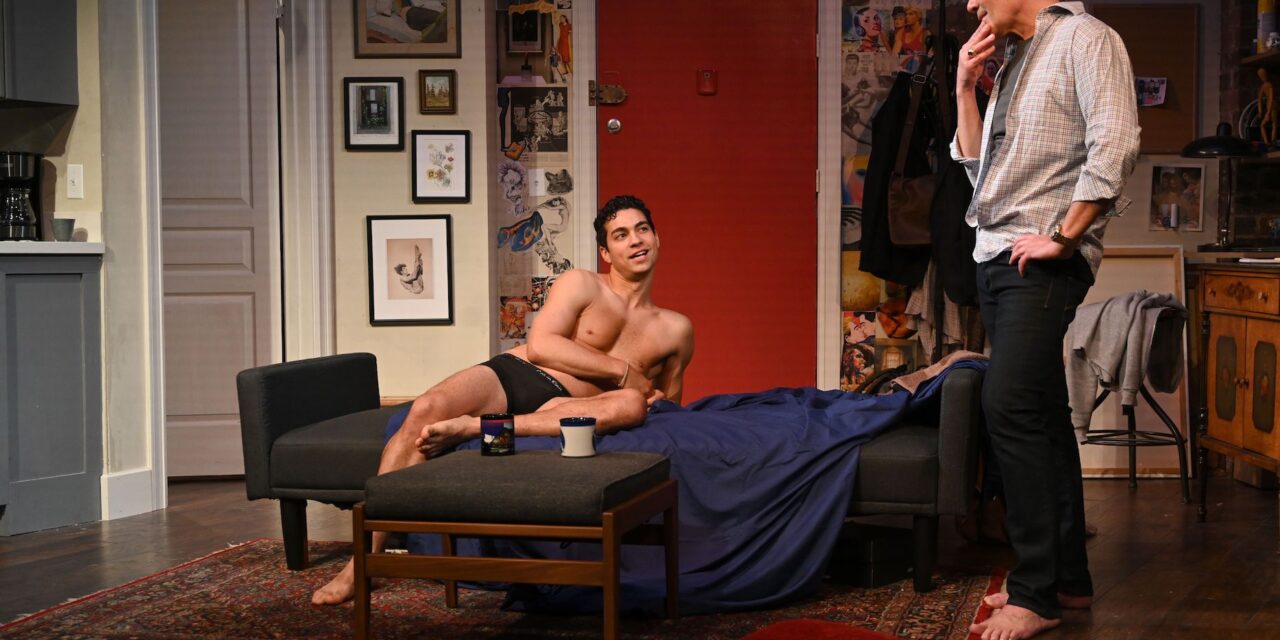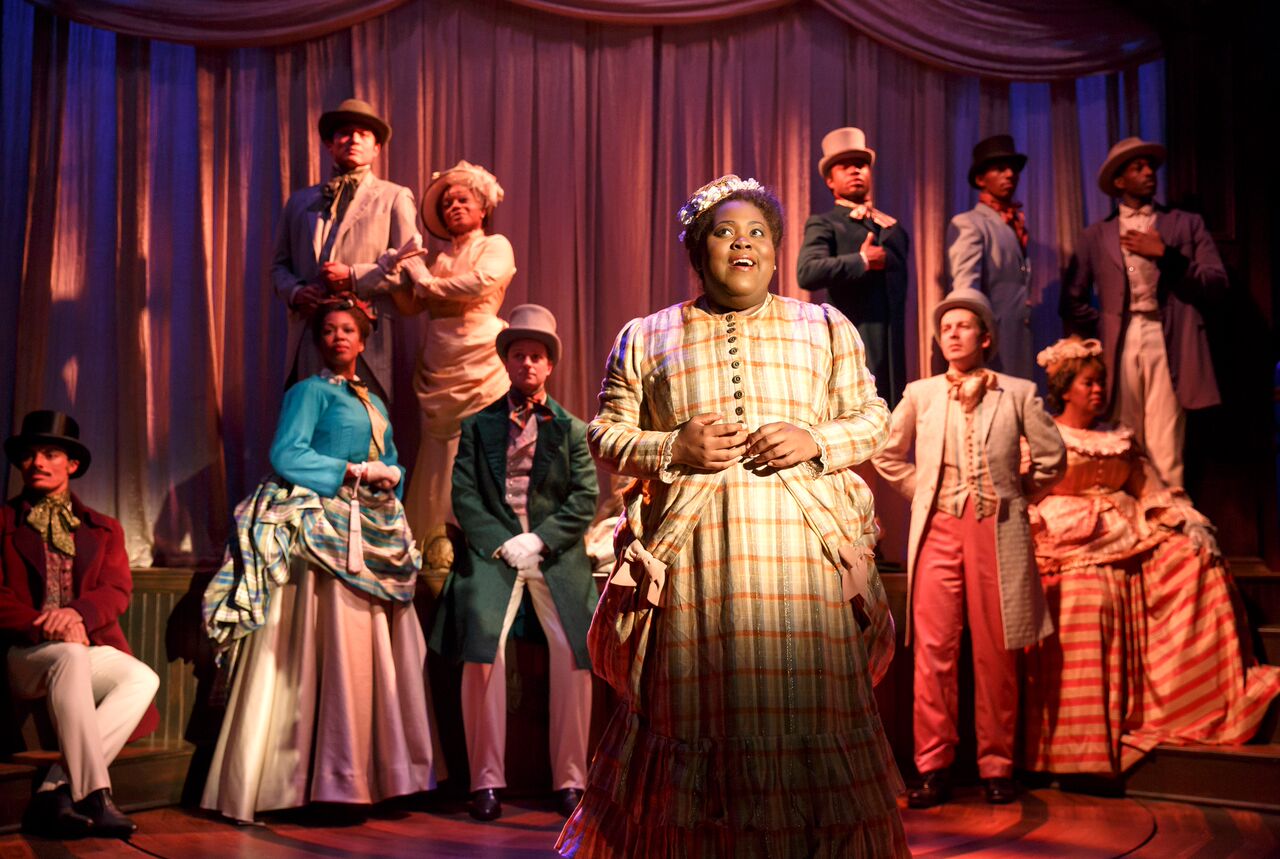By Samuel L. Leiter . . .
I have a bone to pick, but first the play: Mr. Parker, originally produced by Island City Stage, Fort Lauderdale, in 2018. Michael McKeever (Daniel’s Husband) has written a smartly-acted, briskly-paced, 90-minute domestic drama about Terry Parker (Derek Smith), a 54-year-old, gay, New York writer who lives in the Ansonia on the Upper West Side. Terry’s unable to break free of the grief and guilt he feels following the death, seven months earlier, of Jeffrey, his longtime lover and, later, husband. Jeffrey, a successful artist, died after a car accident in which Terry was driving, and after which Terry had difficulty deciding on taking him off life support.
One morning, after a night of carousing he can’t remember (an unfortunate cliché), Terry wakes up in Jeffrey’s East Village atelier—whose presence signals how he keeps clinging to the past—to discover that he’s brought home and had sex with a handsome, 28-year-old stud named Justin (Davi Santos). The rest of the play deals with how he navigates his relationship with Justin—whose motives are a bit cloudy—and how he manages to break out of his emotional rut.
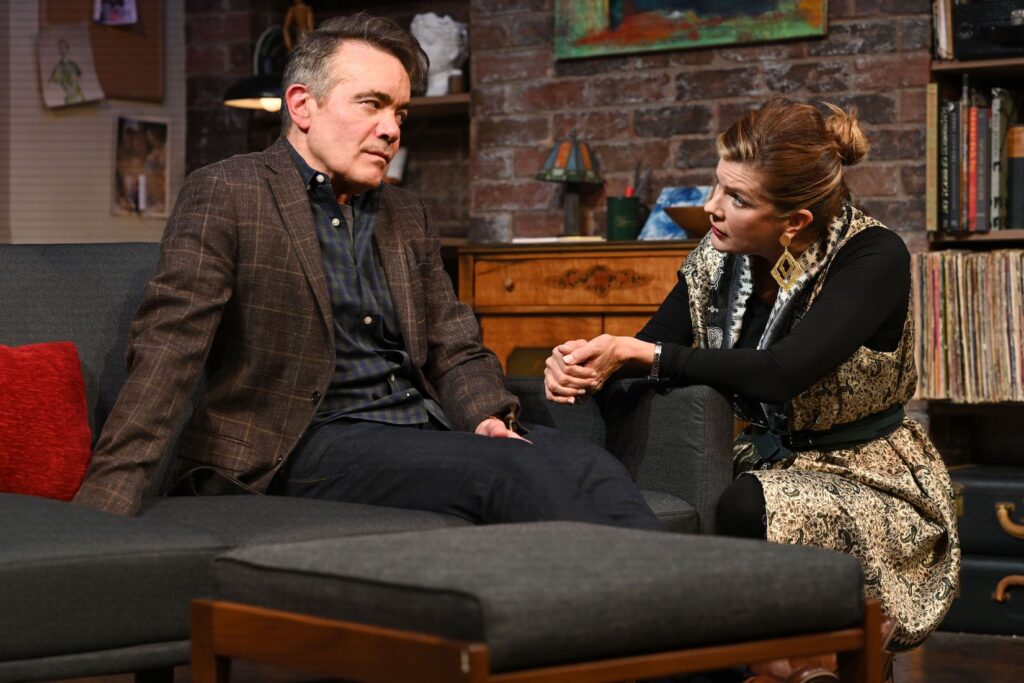
Overseeing it all is his elegant sister-in-law, Cassandra (Mia Matthews), an icily efficient but cynically insightful woman who was her brother’s successful, take-no-prisoners business manager. Cassandra’s agenda is to break up the Terry-Justin relationship and to get Terry to agree to an exhibition of Jeffrey’s work at the Whitney.
More later, but here’s the bone (perhaps the wrong word). Seconds after the lights come up on stage, Justin enters and we see each and every inch and appendage of his ripped physique. After hanging around for a minute or two, giving us and the surprised Terry an opportunity to peep at his pee-pee, he puts on his briefs. If this kind of thing interests you, don’t be late because it doesn’t happen again. Preferably, it shouldn’t have happened to begin with.
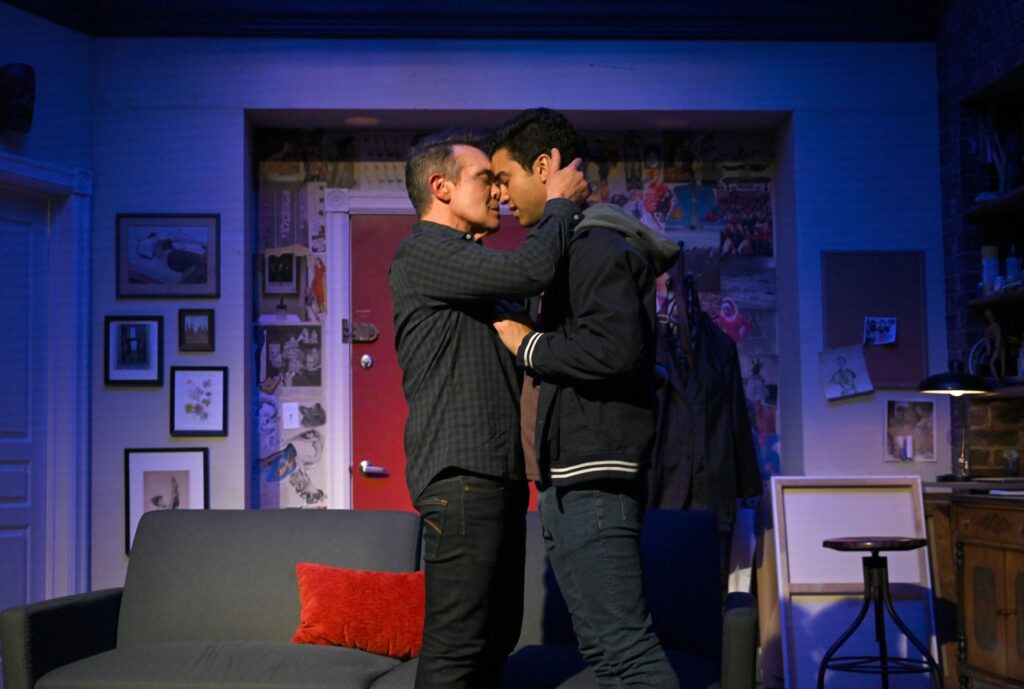

The recent outbreak of audience members sneaking photos of nude actors and posting them online has become enough of a problem that theatergoers at such shows are now asked to put their phones in a locked pouch so they can’t be used to take surreptitious photos. It’s a problem big enough to have inspired a New York Times article this week. It seems, though, that some depraved spectators use a second phone as a roundabout after placing another one in the pouch. It’s bad enough you have to show proof of vaccination (for which I approve) at certain theaters, as well as wear a mask; but also having to abandon your phone is not likely to enhance your theatergoing experience.
At any rate, the nudity here is definitely intended for shock value. Whatever “artistic” rationale can be conjured for its necessity can only be specious. It’s an unnecessary distraction (which I also think is true for the preponderance of nudity in Broadway’s Take Me Out) and Mr. Parker is good enough to have done without it. The very idea that you have to give up your phone (not that there’s an intermission where you can check it) because you might do something illegal is enough to draw attention to the fact that you’re going to be seeing something naughty.
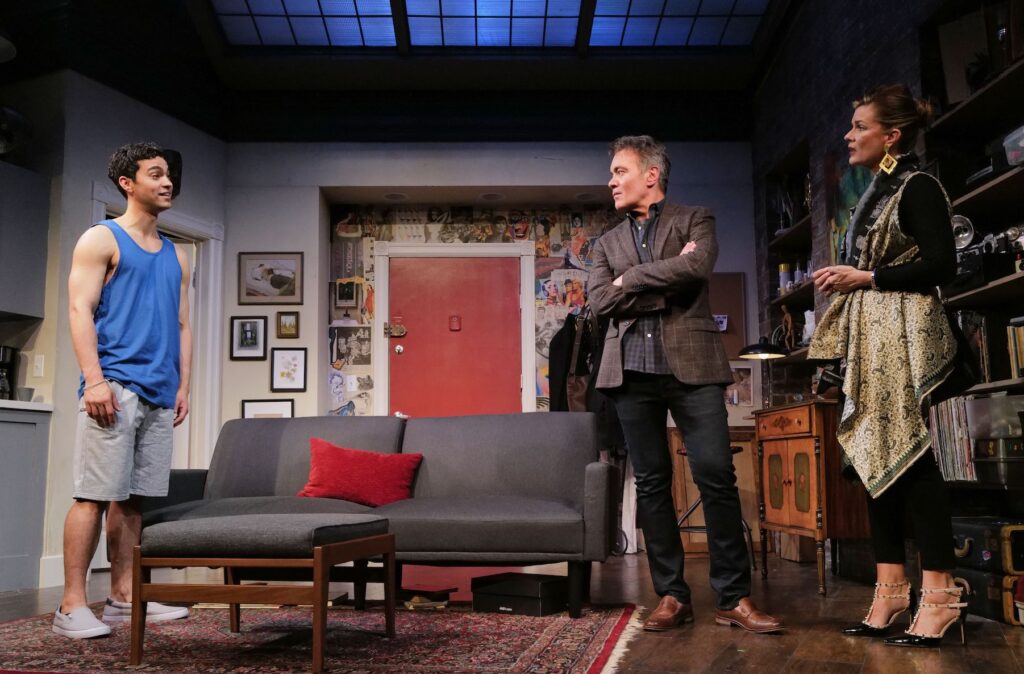

Back to Mr. Parker . . . McKeever’s play about loss and grief is one many can relate to, be they straight or gay. It’s entirely possible to see this play being about a man who’s lost his wife and, after months of mourning, seeking solace in the arms of a female hookup. McKeever, however, deepens his approach by conversations regarding the spectrum of differences among gays: Terry being more old-school and conservative, Justin more experimental.
There’s also amusement in Terry’s discomfort with social media—being more comfortable with a landline and answering machine than with texting, for example, or being dependent on CDs for music. And, Mr. McKeever doesn’t fail to have a cute conversation (or should I say, “convo”) about words like cisgender, non-binary, and the like, not to mention personal pronouns, which Justin, of course, defends.
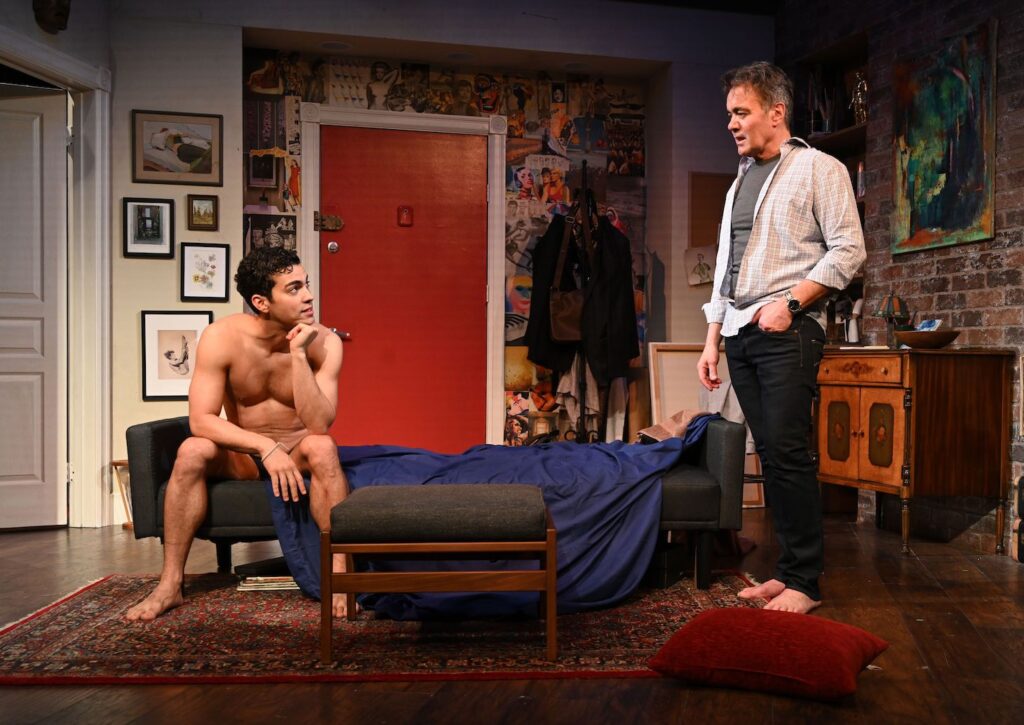

Pretty as he is, Justin is not your standard boy-toy. He may be an Uber driver (so is current “Jeopardy” champion Ryan Long), but he’s intelligent and articulate. It’s impossible not to question his sincerity in hooking up with Terry, and, thanks to the suspicious Cassandra, we do learn some things about him he’d rather keep secret; but, as nicely scored by Davi Santos, he still manages to earn our sympathy as a guy who may not quite fit the Machiavellian stereotype.
Cassandra, perfectly notched by Mia Matthews, is the play’s voice of reason, regardless of those who characterize her as a “monster.” Ms. Matthews handles the byplay with her costars with both classy aplomb and earthy honesty, making her every scene attention grabbing.
Derek Smith, a regular on New York stages, can sometimes be a bit stagey. But, as Terry Parker he’s in his element, playing a recognizable character aware of his emotional blockages and doing his best to survive in a world from which he feels increasingly alienated until, with the help of Justin and Cassandra, he finds the courage to move forward. The playwright has given him several long, expository soliloquies—spoken to the audience—and Mr. Smith uses them to excellent effect to get us on his side, even when we get frustrated at Terry’s self-pitying procrastinations.
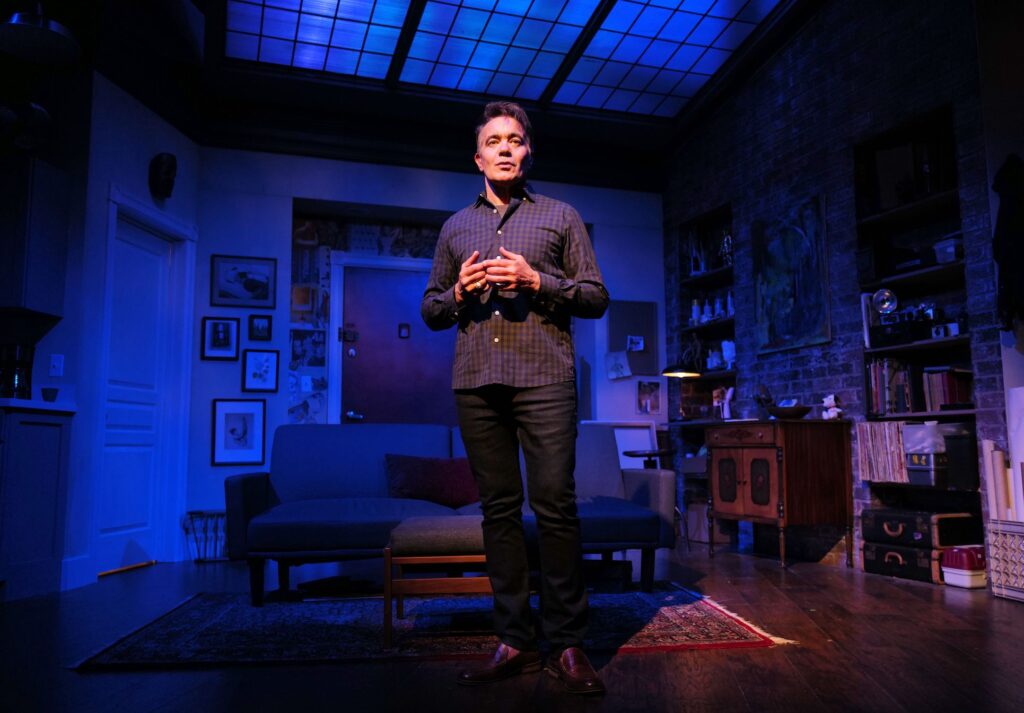

Joe Brancato’s insightful direction keeps the performances rooted in the conversational reality necessary in its tiny Theatre Row venue. David Goldstein uses the small stage to his advantage to create a reasonable facsimile of an artist’s studio (skylight included), while Todd Wren lights it with sensitivity. Myra Orney supplies character-appropriate costumes, especially Cassandra’s stylish pants outfits, and Max Silverman enhances everything with just-right music and sound.
There’s nothing in Mr. Parker that’s artistically or thematically groundbreaking, and the situations and characters are familiar; but, in the capable hands of its director and three actors, it maintains a level of solid interest sufficient for an hour and a half of quality theater. One of the play’s dominant themes is about “legacies”—what we leave for those who come after to remember. Whatever else Mr. Parker’s legacy turns out to be, I’m afraid that in many minds it’s going to have something to do with a pouch and a penis.
Mr. Parker. Through June 25 Theatre Row (410 West 42nd Street, between Ninth and Tenth Avenues). www.bfany.org/theatre-row/shows/mr-parker.
Photos: John Quilty


